
THE VOICE OF INTERNATIONAL LITHUANIA
|
VilNews has its own Google archive! Type a word in the above search box to find any article.
You can also follow us on Facebook. We have two different pages. Click to open and join.
|
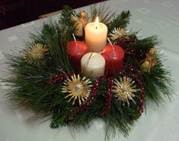
time of the year...
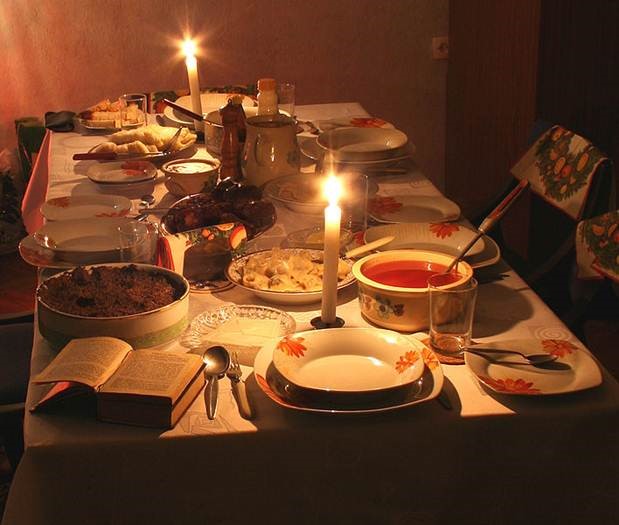
By: Saulene Valskyte
Christmas is probably the most important celebration in the whole Christian world, but Lithuanian Christmas traditions are outstanding, even in this context. Lithuania has a very rich history and many historical events have influenced our traditions, starting with hints of paganism, followed by remainders from the Soviet occupation, and finishing up with the intrusion of the modern world. In this article I will tell you a little bit about our Christmas traditions—how they should be and how they are still celebrated today. Gero apetito! Skanaus! Linksmų Kalėdų!
First of all, I have to point out that in Lithuania Christmas Eve (Kūčios) supper is the most important part, normally celebrated at home with family and close relatives. Also lonely people are invited to the Christmas Eve supper, because nobody should be alone at Christmas. Another important thing to remember is that, during the Soviet occupation, not everyone celebrated Christmas. For example, my mother didn't celebrate as a child, because my grandma was afraid that if her children said something about it in school, they might bring trouble home. Because my grandma, being a doctor, was already watched by authorities, she did not want to run more risk. In those days, authorities tracked anyone for any kind of reason, and especially medical staff because they often treated those considered criminals against the nation, and had possibilities to help them.
Preparation for Christmas starts at the beginning of Advent, by which time farm work is completed. Advent begins with St. Andrew's day, lasts four weeks, and ends on Christmas Eve. According to folk tradition, Advent is the time for peace and spiritual purification. But in addition to peace, Advent brings also a mysterious, mystical time, when the spirits of the spirit-world return to interfere in people's lives. Elders believed that during this season of darkness, unfriendly spirits were creeping around, trying to cause harm to people and their jobs, to winter crops, to livestock and so on. Various prohibitions were therefore abundant. These affected household chores, nutrition, and entertainment. Forbidden during this season were sheep shearing, wood cutting, and other noisy activities. It was forbidden to dance, to sing and to party, or to stay up late in the evenings. Except for children or the sick, people were not allowed to eat meat or prepare food with animal fat.
Only a few of these rules are observed today: some people don't party as much, and there are some that don't eat meat—but even then, not during the entire Advent, usually just the last week before Christmas. One more tradition is to make an Advent wreath—a wreath with four candles, one candle per Advent week. It is usually placed in the window, a single candle is lit the first week, and one additional candle is lit each subsequent week. In Lithuania today, Christmas eve is a national holiday, so no one has to work. I should say "should not work," but all supermarkets and shops are usually open, just close a bit earlier.
December 24th, Christmas Eve, all noisy activities were strictly forbidden, because that would bring thunderstorms the upcoming summer. According to old rituals, people washed themselves clean and put on clean clothes. Then the table was prepared for the kūčios gathering.
Preparing the Christmas Eve table was very important. Now not many people do it by the rules, but the right kind of preparation makes the Christmas Eve supper more special and fun. First of all, there should be some straw put under the white tablecloth because after supper ends, straws are used to show the future. Reaching under the cloth, and not peeking, each person draws a straw. The length of the straw foretells the length of the person’s life.
There is always one empty place set at the table for the spirits of dead relatives. Some food must be left on that plate for the entire night. The candles that decorate the Christmas Eve table are also used for some magic after supper: the ritual of pouring wax. Tradition requires each person to take a burning candle from table and—with a steady hand—to pour some hot wax into a bowl of cold water. After the wax has hardened, it is removed from the bowl. Turning it about reveals some strange figure, which has to be handed to the oldest member of the family. This person then explains what he/she sees in the shape, and pronounces what is waiting for you in the future.
Christmas Eve supper, kūčios, should begin with the rising of the evening star. It must consist of twelve dishes in honor of the twelve apostles. Everyone is obliged to try each dish.
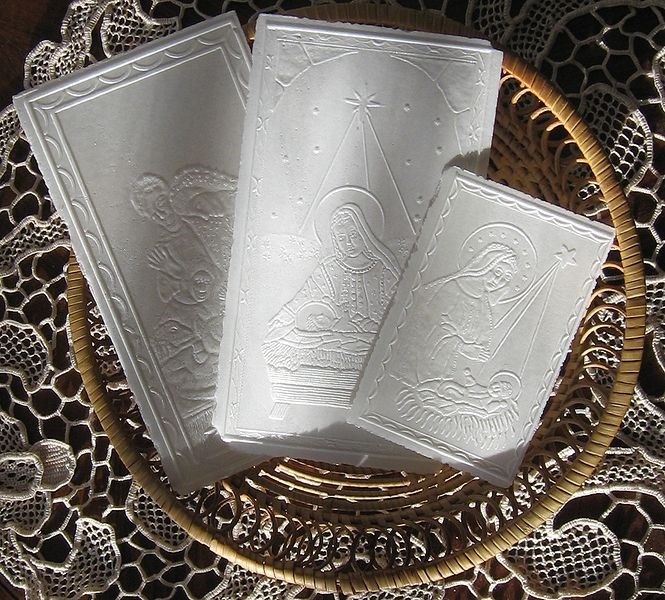
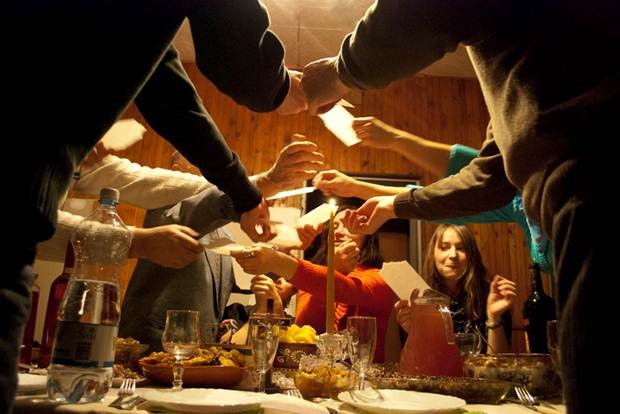
There is also a special white pastry that people can get in the church. Lithuanians call it "plotkelė" (Christmas wafer). There should be one for each member of the family. In the very beginning of the Kūčios supper starts everybody prays and then breaksplotkelė and tell what they wish for each others. The lotkelė is also known as kalėdaitis,paplotėlis, plokštainėlis or Dievo pyragai depending on the region of Lithuania a family is from.
Meat is forbidden until Christmas Day morning, the meatless supper is probably the one tradition that everyone in Lithuania still follows.
Some Christmas Eve games to play after the supper:
Draw Kūčiukai
This is game for single girls. Put your hand in to the bowl of Kučiukai and grab as many as you can, then put them on the table. If the number is even you will find a guy, if not you will remain single the coming year.
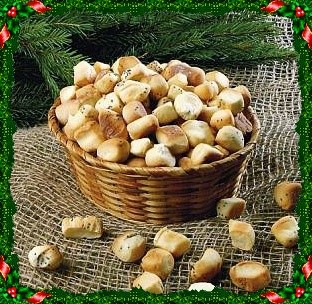
Pick up firewoods
It's very similar to Draw Kūčiukai. Go to the place where you are keeping the fire wood and take as many logs as you can. Than count them, if the number is even you won't be single next year if not you will remain single.
Glass of water
Before going to sleep eat as much herring or just fish as you can, and put a glass of water next to your bed. In your dream, a guy will hand you that water and he will became yours husband one day.
Throw a shoe
This is a game for those who still lives with their parents. Stand in the room so that your back would be facing the door and throw a shoe over your head or shoulder. Then look which way shoe has landed. If the shoe is facing the doors this year you will be leaving home, if it's facing into the room you will stay at your parents.
As I mentioned earlier, the Christmas Eve supper includes twelve dishes. There are some dishes that are "musts" and some optional. "Must" dishes on Christmas Eve table are Kūčiukai (It's very simple Christmas eve pastry with poppy seeds, it's not very sweet, but very delicious. It's made by mixing 0.5 kg of flour, a bit less than 200 ml of milk (water), 50 grams of oil, a pinch of salt, 20-30 g of yeast, a quarter cup of poppy,100 grams of sugar. Raise a dough a bit and form little kūčiukai, then bake it).
Another very traditional dish is cranberry pap. Pap can be served as a dessert or a drink, depending on the consistency of the pap (it's a berry drink or dessert made from water, berry juice, sugar and starch).
Another very traditional dish is cranberry pap. Pap can be served as a dessert or a drink, depending on the consistency of the pap (it's a berry drink or dessert made from water, berry juice, sugar and starch).
Because meat is strictly forbidden there are a lot of fish dishes on the table. Most popular are herring dishes. Herring with carrots, or red beets, are most common. Also all kinds of mushrooms are used for Christmas food.
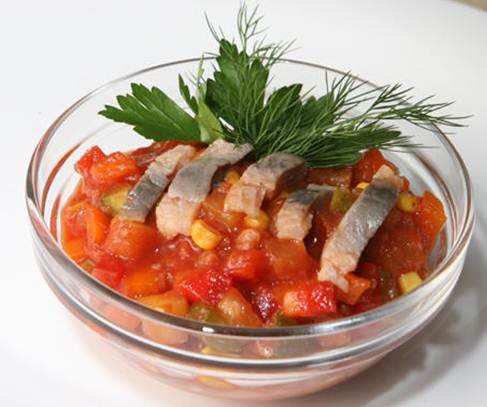
Now for a lot of people Christmas is associated with mandarins. This came from the times of Soviet occupation. There were mandarins appearing in shops all around Lithuania during Christmas time, so people were spending hours standing in huge lines outside the groceries, to get some fresh fruits in the middle of the winter. Of course because of communistic regime there were set certain amounts per person to buy, so fruits in wintertime were especially valued. Even now, and even for the younger generatio,n the smell of mandarins reminds us about Christmas.
Christmas is the time to celebrate and spend magical time with our families, and although we live in the modern world and have less and less time for ourselves, let’s stop for a minute, for Christmas, for ourselves, for our families and let’s make this celebration special, remembering our heritage, who we really are and what makes us special. Have a merry and very Lithuanian Christmas!

Category : Historical Lithuania
- Bookmark :
- Digg
- del.icio.us
- Stumbleupon
- Redit it
VilNews e-magazine is published in Vilnius, Lithuania. Editor-in-Chief: Mr. Aage Myhre. Inquires to the editors: editor@VilNews.com.
Code of Ethics: See Section 2 – about VilNews. VilNews is not responsible for content on external links/web pages.
HOW TO ADVERTISE IN VILNEWS.
All content is copyrighted © 2011. UAB ‘VilNews’.

 Click on the buttons to open and read each of VilNews' 18 sub-sections
Click on the buttons to open and read each of VilNews' 18 sub-sections 



I loved your article post. And I can't wait to explore more of it>>>>>>>
South India Luxury Tours
Hi there, really Nice Post and a lot of informative content. I really appreciate your technique for writing a blog. Just saved it to my bookmark site list and will be checking back in the near future
thank for this amazing post if someone is looking for amazing shoes go and check out http://lushdicker.com they have amazing shoes with amazing price range